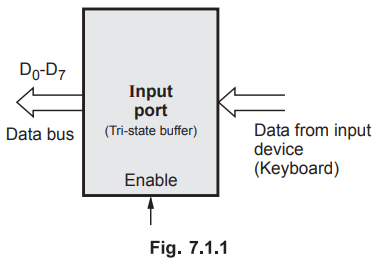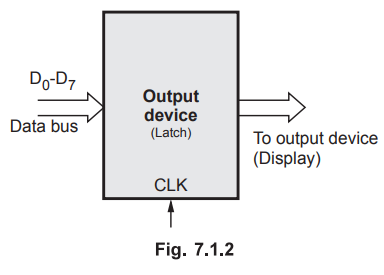Microprocessors and Microcontrollers: Unit I: (e) I/O Interfacing
I/O Interfacing
Review Question : 1. What do you mean by input port and output port ?
Unit – I
Chapter - 7
(e) I/O Interfacing
Contents
7.1
Introduction .... May-08
7.2
I/O Interfacing Techniques in 8085 ...
May-04,05, 06,07,12,16, ... Dec.-04, 05, 09,10,12 ... Marks 10
7.3
Data Transfer Schemes ... Dec.-08 ....
Marks 10
7.4
Two Marks Questions with Answers
7.5
University Questions with Answers (Long Answered Questions)
Introduction
AU
: May-08
Any
application of a microprocessor based system requires the transfer of data
between external circuitry to the microprocessor and microprocessor to the
external circuitry. User can give information to the microprocessor based
system using keyboard and user can see the result or output information from
the microprocessor based system with the help of display device. The transfer
of data between keyboard and microprocessor and microprocessor and display
device is called input/output data transfer or I/O data transfer. This data
transfer is done with the help of I/O ports.
Input
port : It is used to read data from the simplest form of
input port is a buffer. The input device is connected to the microprocessor
through buffer, as shown in the Fig. 7.1.1.

This
buffer is a tri-state buffer and its output is available only when enable
signal is active. When microprocessor wants to read data from the input device
(keyboard), the control signals from the microprocessor activates the buffer by
asserting enable input of the buffer. Once the buffer is enabled, data from the
input device is available on the data bus. Microprocessor reads this data by
initiating read command.
Output
port : It is used to send data to the output device such
as display from the microprocessor. The simplest form of output port is a
latch. The output device is connected to the microprocessor through latch, as
shown in the Fig. 7.1.2. When microprocessor wants to send data to the output
device it puts the data on the data bus and activates the clock signal of the
latch, latching the data from the data bus at the output of latch. It is then
available at the output of latch for the output device.

In
this chapter, we will see the interfacing concepts of these I/O devices and
different methods of I/O transfer.
Review Question
1. What do you mean by input port and output port ?
Microprocessors and Microcontrollers: Unit I: (e) I/O Interfacing : Tag: : - I/O Interfacing